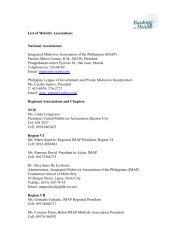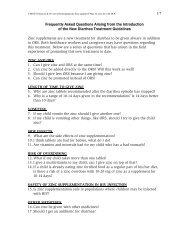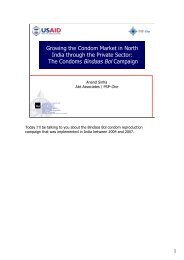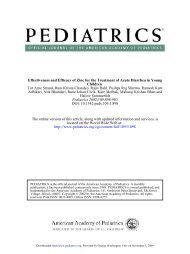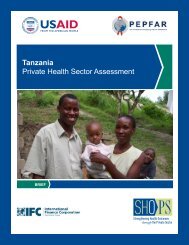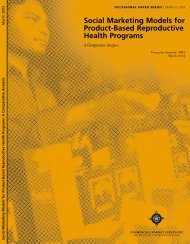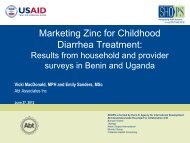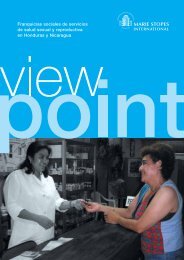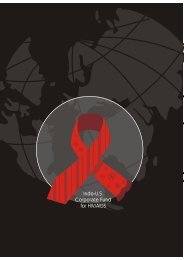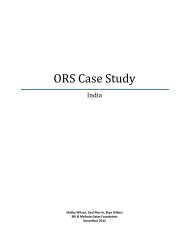Nigeria Private Sector Health Assessment - SHOPS project
Nigeria Private Sector Health Assessment - SHOPS project
Nigeria Private Sector Health Assessment - SHOPS project
Create successful ePaper yourself
Turn your PDF publications into a flip-book with our unique Google optimized e-Paper software.
the 10 percent copayment) out of his or her capitation for essential drugs. The NHIS does not cover<br />
prescription drugs not on the essential drugs list. This scheme for drug reimbursement is not feasible in<br />
many areas of <strong>Nigeria</strong> because of the shortage of licensed pharmacies. Essential drugs obtained through<br />
PMVs are not reimbursable in the NHIS. Some doctors also worry that patients will not or cannot<br />
afford to travel to a pharmacy and they may not fill their prescription. Pharmacists are unhappy about<br />
being dependent on primary physicians for their payments. Now they will have to market themselves<br />
to physicians to be eligible for NHIS reimbursements. Consumers are not able to fill their prescriptions<br />
where they like, but instead will be limited to using pharmacists with whom their physician has a<br />
business relationship for reimbursement.<br />
Enrollees are assigned to an HMO according to their place of work. HMOs provide a list of primary care<br />
providers and enrollees pick available providers from this list. Enrollees receive photo ID cards (for a<br />
fee). Frequent switching of primary care providers is permitted.<br />
Most HMOs see a major skills deficit in primary care providers in terms of prevention, counseling, and<br />
patient management. Previously most of their practice was episodic clinical care. Incentives were to<br />
maximize prescriptions and tests (which the clinician often provided). Clinicians did not provide much<br />
in the way of prevention or patient education. Some doctors do not even know the immunization<br />
schedule. Enrolling providers into the scheme has been led by HMOs who have struggled with how to<br />
accredit providers without investing in expensive quality assessments.<br />
State-level branches of the NHIS are responsible for accrediting providers. Nursing homes and maternity<br />
homes can become accredited NHIS primary care providers. State facility licensure is a prerequisite for<br />
accreditation, but established HMOs feel that some facilities are being accredited that should not be<br />
(and that would not be accredited in private plans).<br />
The NHIS also accredits HMOs for both public (NHIS) and private plans, as well as banks and insurance<br />
brokers that participate in the plan. HMOs see this function as a problem and think that the NHIS blurs<br />
the boundaries between its operational and regulatory responsibilities.<br />
The NHIS establishes the capitation and fee schedules for drugs, tests, and referrals. HMOs process<br />
and pay capitation and fee-for-service claims. They receive 15 percent of the total premium as an<br />
administrative fee, with 1.5 percent returned to the NHIS for regulation and reserves. Current primary<br />
care capitation is 550 naira per enrollee (no differentiation and no risk cap) per month, paid in advance.<br />
The <strong>Nigeria</strong>n Medical Association and some providers complain that this amount is not enough, but it<br />
seems they have done little analysis of actual costs. One of the components of the management training<br />
PSP-One is developing in partnership with Total <strong>Health</strong> Trust (THT) will be the introduction of practical<br />
cost-tracking systems that allow providers to assess how they are doing under capitation and what the<br />
costs and benefits are for providing reproductive health services.<br />
24



